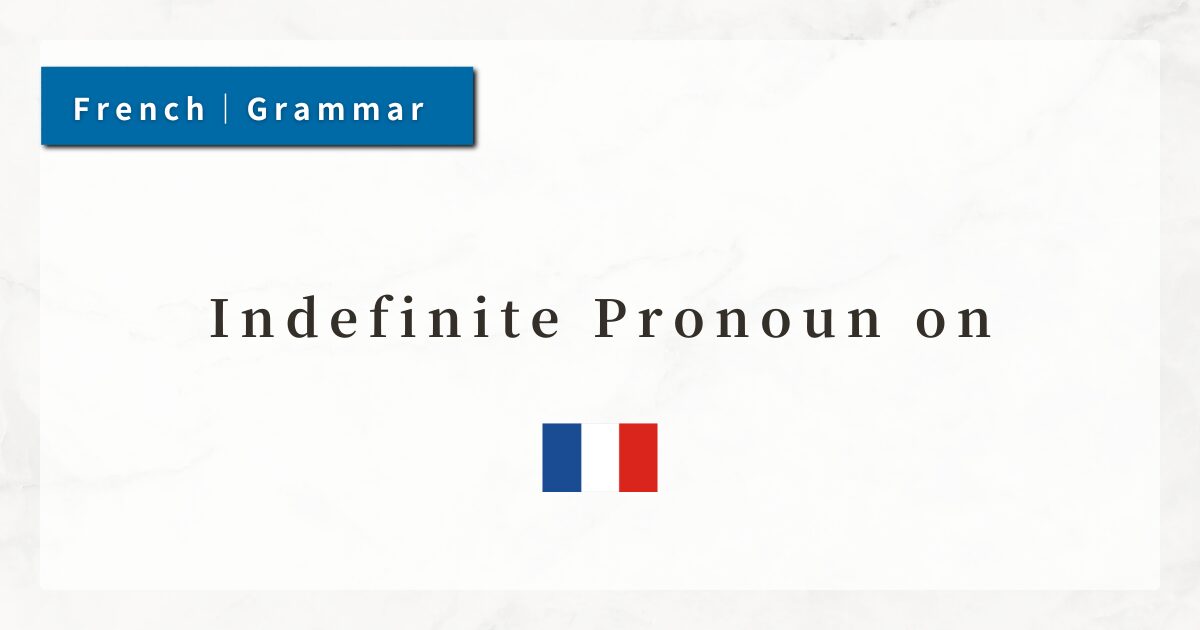#70 Indefinite Pronoun on | Meaning, Usage, and Example Sentences

The French indefinite pronoun on is extremely common in both spoken and written French. Because it does not translate directly into English, its meaning shifts depending on the context: it can mean “people,” “we,” or “someone.”
In everyday conversation, on is frequently used to mean “we,” and it often replaces nous in casual speech.
In this lesson, I will explain the basic meanings and uses of on, along with important points to remember.
1. Basic Uses of on
1-1. Referring to people in general
On is used when stating general truths or social facts. It corresponds to the English “one/people.”
- On vit plus longtemps aujourd’hui qu’auparavant.
(People live longer today than in the past.) - On dit que le café est bon pour la santé.
(It is said that coffee is good for one’s health.)
Here, on refers to “people in general” without including the speaker or listener.
1-2. Referring to an unspecified person
On is used when the subject is unknown or deliberately left unspecified. This usage is close to English someone.
- On a volé mon sac !
(Someone stole my bag!) - On frappe à la porte.
(Someone is knocking at the door.)
1-3. Meaning “we”
In everyday French, on often means “we.” In fact, in spoken French, on is far more common than nous.
- On y va ?
(Shall we go?) - On a gagné le match !
(We won the match!)
n this case, on refers to “you and me” (a complete “we”) and is used in friendly, informal contexts.
2. on Always Takes Third-Person Singular Verbs
Even when on means “we,” it is grammatically treated as third-person singular. Therefore, the verb form must always agree with the third-person singular.
- On parle français ici.
(French is spoken here.) - On va au cinéma ce soir ?
(Shall we go to the cinema tonight?)
In both cases, the verbs (parle / va) are in the third-person singular.
3. Possessive Adjectives: notre / nos
When on means “we,” the possessive adjectives used are the same as for the first-person plural (notre / nos).
- On aime notre maison.
(We love our house.) - On prépare nos valises.
(We are preparing our suitcases.)
Thus, on is grammatically a “hybrid”: verbs are third-person singular, but possessives are first-person plural.
4. Difference Between on and nous
Both on and nous mean “we,” but they differ in usage.
| Item | on | nous |
|---|---|---|
| Grammatical agreement | Third-person singular | First-person plural |
| Possessive adjectives | notre / nos | notre / nos |
| Frequency in speech | Very frequent | Relatively rare |
| Nuance | Informal, friendly, conversational | Formal, written style |
In written or formal contexts, nous is preferred. In everyday conversation, however, on is more natural. In short, nous is formal, while on is colloquial.
5. Summary
- “on” is an indefinite pronoun used to mean “people,” “someone,” or “we,” depending on context.
- Verbs with “on” always take the third-person singular form.
- When “on” means “we,” possessive adjectives are notre / nos.
- In conversation, “on” is far more common than “nous.”




